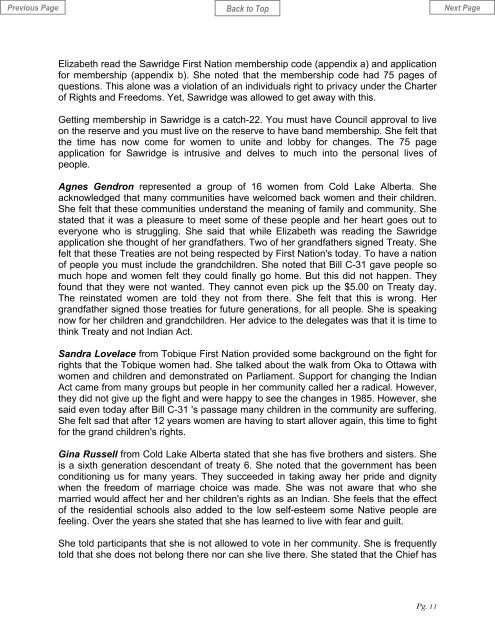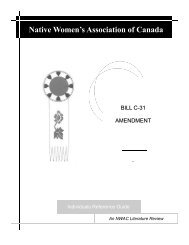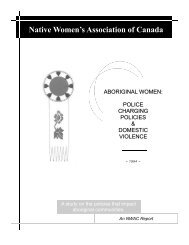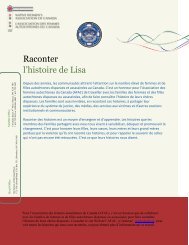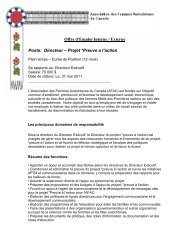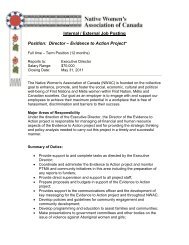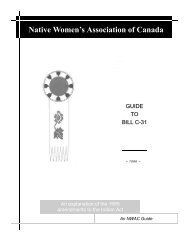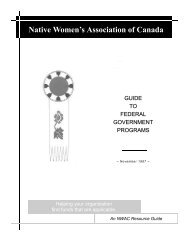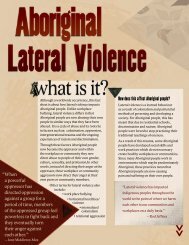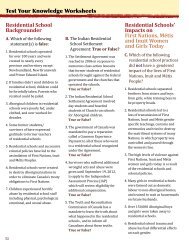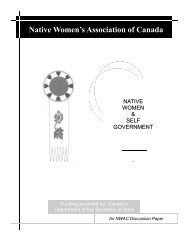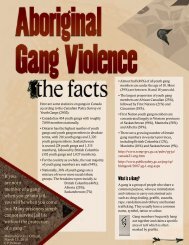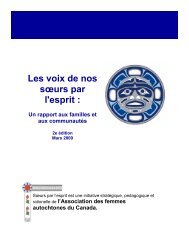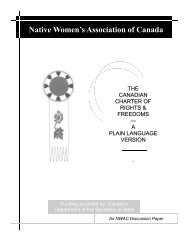BILL C-31 - Native Women's Association of Canada Website
BILL C-31 - Native Women's Association of Canada Website
BILL C-31 - Native Women's Association of Canada Website
- No tags were found...
Create successful ePaper yourself
Turn your PDF publications into a flip-book with our unique Google optimized e-Paper software.
Elizabeth read the Sawridge First Nation membership code (appendix a) and applicationfor membership (appendix b). She noted that the membership code had 75 pages <strong>of</strong>questions. This alone was a violation <strong>of</strong> an individuals right to privacy under the Charter<strong>of</strong> Rights and Freedoms. Yet, Sawridge was allowed to get away with this.Getting membership in Sawridge is a catch-22. You must have Council approval to liveon the reserve and you must live on the reserve to have band membership. She felt thatthe time has now come for women to unite and lobby for changes. The 75 pageapplication for Sawridge is intrusive and delves to much into the personal lives <strong>of</strong>people.Agnes Gendron represented a group <strong>of</strong> 16 women from Cold Lake Alberta. Sheacknowledged that many communities have welcomed back women and their children.She felt that these communities understand the meaning <strong>of</strong> family and community. Shestated that it was a pleasure to meet some <strong>of</strong> these people and her heart goes out toeveryone who is struggling. She said that while Elizabeth was reading the Sawridgeapplication she thought <strong>of</strong> her grandfathers. Two <strong>of</strong> her grandfathers signed Treaty. Shefelt that these Treaties are not being respected by First Nation's today. To have a nation<strong>of</strong> people you must include the grandchildren. She noted that Bill C-<strong>31</strong> gave people somuch hope and women felt they could finally go home. But this did not happen. Theyfound that they were not wanted. They cannot even pick up the $5.00 on Treaty day.The reinstated women are told they not from there. She felt that this is wrong. Hergrandfather signed those treaties for future generations, for all people. She is speakingnow for her children and grandchildren. Her advice to the delegates was that it is time tothink Treaty and not Indian Act.Sandra Lovelace from Tobique First Nation provided some background on the fight forrights that the Tobique women had. She talked about the walk from Oka to Ottawa withwomen and children and demonstrated on Parliament. Support for changing the IndianAct came from many groups but people in her community called her a radical. However,they did not give up the fight and were happy to see the changes in 1985. However, shesaid even today after Bill C-<strong>31</strong> 's passage many children in the community are suffering.She felt sad that after 12 years women are having to start allover again, this time to fightfor the grand children's rights.Gina Russell from Cold Lake Alberta stated that she has five brothers and sisters. Sheis a sixth generation descendant <strong>of</strong> treaty 6. She noted that the government has beenconditioning us for many years. They succeeded in taking away her pride and dignitywhen the freedom <strong>of</strong> marriage choice was made. She was not aware that who shemarried would affect her and her children's rights as an Indian. She feels that the effect<strong>of</strong> the residential schools also added to the low self-esteem some <strong>Native</strong> people arefeeling. Over the years she stated that she has learned to live with fear and guilt.She told participants that she is not allowed to vote in her community. She is frequentlytold that she does not belong there nor can she live there. She stated that the Chief hasPg. 11


